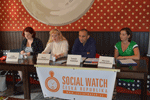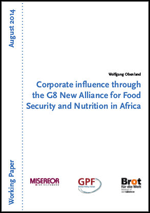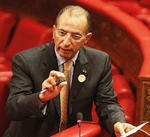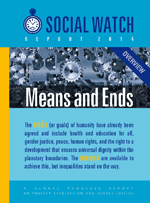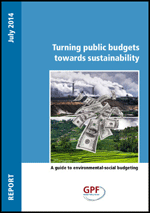Social Watch news
Published on Wed, 2014-08-13 11:07
Palestinian NGOs Network (PNGO) called on the international community and the United Nations (UN) to speed up implementation of declaration of Gaza Strip a 'humanitarian disaster zone'.
PNGO demanded to ensure the flow of all forms of humanitarian aids as well as evacuate the injured and secure a protection for the civilians, in the light of the continuing Israeli offensive and its repercussions on the initially deteriorated humanitarian situation in the besieged Gaza Strip.
The Palestinian NGOs Network (PNGO) on Tuesday 12, held a press conference at Gaza's Al-Shifa Hospital Compound, with participation of each of Chairman of the Board of the Palestinian NGOs Network, Mohsen Abu Ramadan, and member of the Palestinian NGOs Network's Administrative Board, Tayseer Muheisen, and Director of PNGO Amjad Al-Shawa.
|
Published on Tue, 2014-08-12 10:34
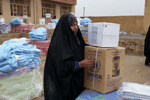
Women of Al-Anbar Iraq. Photo:
UNHCR Iraq
|
Almost eleven years have passed since the US toppled Saddam Hussain’s regime, and Iraq still continues to struggle. In December 2013, Iraq national security forces stormed the private residence of the Iraqi Finance Minister, arresting several of his staff for supporting terrorism. This incident served as a trigger for sectarian violence throughout the Sunni triangle in southern Iraq – Al--‐Anbar Province. It was one of the areas that led peaceful demonstrations on February 2011, but subsequently witnessed the highest amount of sectarian violence, including government security force attacks on civilians.
The recent advancement of Islamic State of in Iraq and Syria (ISIS or Daesh) forces in Mosul and other areas in Iraq has caused great concern about the prospects of peace. Policymakers are scrambling to figure out an appropriate strategy to limit further advancement and prevent further security breakdown.
|
Published on Mon, 2014-08-11 09:23
The Arab NGO Network for Development (ANND) and the Arab Organization for Administrative Development (ARADO), in cooperation with ESCWA and the Dag Hammarskjöld Foundation, organized an Arab forum (on the 14-15 and 15 of July 2014) to discuss the challenges to the Post-2015 process and the potential obstacles against addressing the social and economic hardships that the region suffers from. The forum brought about policy recommendations for the relevant regional and international processes,namely: The UNCTAD 50th Anniversary, the UN-GA 69th reunion, the Fourth round of the Economic, developmental and Social Summit of the League of Arab States (LAS).
|
Published on Thu, 2014-08-07 12:56
On 30th July 2014 the Czech Social Watch Coalition released the new National Social Watch Report summarizing the development in the year 2013. The title of the report is Czech Republic: Chaos and incompetence in the next year of crisis and it focuses on social development and gender equity, particularly in the following areas: economics, women in politics, social and accessible housing, Roma minority, the lack of community work and human rights agenda in the Czech foreign policy. The publication includes an additional article about the Czech arms export, which is called Czech Republic again equipped dictators with arms in 2013.
|
Published on Wed, 2014-08-06 00:00
Some four thousand years ago, King Hammurabi had the laws of his domains between the Tigris and Euphrates rivers carved in stone and placed in front of his palace. The laws were written in the plain language of the people, not in the arcane idiom of the priests, so that everybody could understand them. They were not engraved on clay, so they could not be changed overnight at will, and they were not hidden, so that all were able to access them and learn, for example, that even judges had a duty not to betray the rules in their decisions.
|
Published on Mon, 2014-08-04 11:46
In recent times, new partnerships models between governments, business and civil society are increasingly gaining attention. One prominent example is the "New Alliance for Food Security and Nutrition" (G8NA), inaugurated at the G8 summit 2012 in the United States.
A new working paper published by Global Policy Forum, Brot für die Welt and MISEREOR, puts a spotlight on how business interests are promoted through the G8NA. To that end, the paper shows how the initiative bundles existing policy initiatives and aligns national policies to corporate interests.
The paper concludes that the approach and objectives of the G8NA are highly problematic. The initiative serves as an enforcing mechanism for corporate driven blueprints for agriculture and sidelines national plans and international standards. It is dominated and tailored towards the interests of big corporate actors and is based on a reductionist approach of agricultural “development”. And lastly, the G8NA is poorly institutionalized and disregards fundamental principles of transparency participation and accountability.
|
Published on Mon, 2014-07-28 14:05
Following the groundless statements of the Minister of the Interior in front of the representatives of the legislative power against associations and human rights movement on 15 July 2014, and on the basis of his conspicuous tendency to lead invalid accusations against Moroccan associations and organizations working in the field of human rights and democratic development, in an attempt to disparage its efforts in advancing and protecting human rights.
|
Published on Thu, 2014-07-24 09:31
A set of 17 sustainable development goals has been adopted after over one and a half years of discussions and negotiations.
The Open Working Group (OWG) on Sustainable Development Goals (SDGs) concluded its 13th session (14-19 July) at the United Nations headquarters in New York following long drawn negotiations that stretched through the night of 18 July, finally leading to the adoption of the final document on Saturday afternoon of 19 July.
|
Published on Fri, 2014-07-18 12:21
The old debate around ends and means usually deals with unacceptable procedures claiming legitimacy because of the intended results. Not any more. In the current international debate around development goals for the United Nations, the “ends” are set so low that no major effort is really required from anybody. “No means are needed if the goals are meaningless” commented report editor-in-chief Roberto Bissio at its launch.
The Social Watch Report 2014, launched on July 9th in New York during the ministerial meeting of the High Level Political Forum of the UN, is a summary review of fifty country reports and an analysis of global trends by civil society organizations. The report, titled “Ends and Means” and it monitors how government and international institutions are doing in implementing their solemn commitments to eradicate poverty, achieve gender justice and promote sustainable development.
|
Published on Fri, 2014-07-18 11:05
Global Policy Forum publishes guide to environmental-social budgeting. International development policy is at a crossroads. By September 2015, governments plan to adopt a Post-2015 Development Agenda – an agenda that is supposed to shape the fundamental priorities, goals and strategies for development policy beyond 2015. In parallel, governments have agreed to develop a set of Sustainable Development Goals integrating all dimensions (social, economic and environmental) of sustainable development and being applicable to all countries in the world. Forming one coherent Post-2015 Agenda, including the SDGs, affects all policy areas beyond development policy in a narrow sense, in particular social, economic and environmental policy – and above all fiscal policy.
|
SUSCRIBE TO OUR NEWSLETTER
Submit

|




